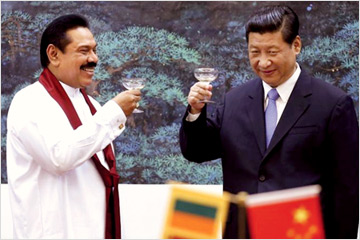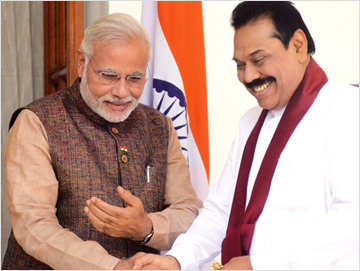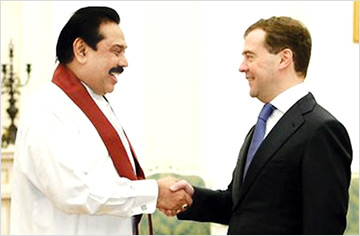|
International community acknowledged Sri Lanka's
victory:
March towards prosperity:
Pearl of the Indian Ocean outshines regional contenders
By Manjula Fernando
 |
|
President Mahinda
Rajapaksa with Pope Francis while Madam Shiranthi Rajapaksa
looks on |
It is
important to record that the far-sighted, brave and purposeful
leadership that the president has shown as the head of state and the
commanding chief of armed forces that Sri Lanka overcame the scourge of
terrorism.
When we look back over the past thirty years, there was not a single
occasion when the forces have backed down, they were always motivated to
defeat the enemy, the LTTE.
When there were critical moments, to defeat the LTTE once and for
all,international pressure was mounted on the Government.
Successive leaders bowed down to such pressure and sat down for Talks
with the LTTE hoping that the LTTE would show flexibility in arriving at
a negotiated political settlement.
When President Rajapaksa took over the mantle of leadership he also
took initial steps towards peace talks in the hope of arriving at a
negotiated political settlement, respecting the territorial integrity,
sovereignty and unity but very soon he saw that the LTTE was only using
discussions to arm themselves even more and consolidate their military
operations.
The president after realising this bitter truth took a very clear
decision that unlike his predecessors he will not bow down to
international pressure, he knew that it would only give breathing space
to the LTTE.
His firmness in defeating terrorism was amazing. There were others
who forced him to give up the military operations, "We are facing a lot
of pressure in our countries to intervene and stop the on going military
operations and if you don't comply, we will not be able to continue our
development aid", they said.
But President Mahinda Rajapaksa replied, "I am seated in this chair
because of the people who voted me to office, I cannot betray them,
their expectation is that my government will wipe out terrorism and give
them freedom, that they have been asking for. If you don't want to give
me aid, so be it I will find development aid from somewhere else'.
He said "I will never let my people suffer or starve, we will somehow
keep the development work going, but I am not going to be flexible on
stopping the military operations, because now we are on the verge of
defeating the biggest scourge that my country has faced".
As he promised the forces were never asked to back down even when
international pressure was critically intense in the last few weeks
before the operations successfully ended in May 2009.
Since then, the country had been seeing a different kind of a battle
to revive the country and march it towards prosperity. He had not sat
down a single day to rest. The battle to steer the country towards the
development which it was deprived of by a bitter prolonged conflict was
begun even before the war with terrorism was concluded. So was his
determination to make this little island nation which is known by the
acronym Pearl of the Indian Ocean outshine its regional contenders.The
international community, those who genuinely acknowledged Sri Lanka's
victory as a nation, endorsed our fight with the terrorists and helped
in numerous ways to rise from the ashes of a bitter past.
While some members of the international community, at the behest of
organised players trying to resurrect the LTTE, kept pulling the leg, a
significant lot spoke on behalf of us at international fora, urging to
recognise what Sri Lanka has achieved after the end of the war.
Australia too has been open in its support for Sri Lanka to overcome
the challenges the country is facing as a war torn nation.
The Australian Prime Minister Tony Abbott defended Sri Lanka's human
rights record, saying the Government was committed to upholding the
democratic charter of the Commonwealth but adding that, 'sometimes in
difficult circumstances difficult things happen'. "Sri Lanka since the
end of the war is free and prosperous, and has a better future and
that's important for everyone," he added during the Commonwealth Heads
of Government Meeting in 2013 in Colombo. Australia had boldly rejected
to co-sponsor the resolutions sponsored by the US at the UNHRC.
The statements by certain powerful nations who objected to the latest
resolution against Sri Lanka at the UN Human Rights Council in March
this year is testimony to this international support.
Statements by world leaders...
Member states must respect Sri Lanka's sovereignty -
China
|

The President toasts Chinese President Xi Jinping
|
Promotion and protection of human rights remains the primary
responsibility of governments. Member states must respect the
sovereignty of Sri Lanka.
The country must also be allowed to settle its own affairs. We must
respect and encourage the government of Sri Lanka to continue to conduct
investigations. Trying to impose and external mechanism of monitoring
and investigation will do nothing into promote of internal efforts of
reconciliation on the contrary it will complicate the situation.
When the international community provides technical assistance to Sri
Lanka, it must fully consult the government and obtain its agreement.
We support the proposal by Pakistan to delete paragraph 10 (calling
for an international investigation). We also call upon other members of
the council to vote in favour of this proposal.
Addressing human rights violations through robust national
mechanisms vital- India
|

Indian Prime Minister Narendra Modi with the President
|
India has always been of the view that the end of the conflict in Sri
Lanka provided a unique opportunity to pursue a lasting political
settlement, acceptable to all communities in Sri Lanka, including the
Tamils.
India believes that this Council's efforts should contribute to a
State's own efforts in the promotion and protection of human rights.
We are strongly supportive of Sri Lanka's continued engagement with
the OHCHR (Office of the High Commissioner for Human Rights).
In asking the OHCHR to investigate, assess and monitor the human
rights situation in Sri Lanka, the resolution ignores the progress
already made by the country in this field and places in jeopardy the
cooperation currently taking place between the Government of Sri Lanka
and the OHCHR and the Council's Special Procedures.
Besides, the resolution is inconsistent and impractical in asking
both the Government of Sri Lanka and the OHCHR to simultaneously conduct
investigations.
India believes that it is imperative for every country to have the
means of addressing human rights violations through robust national
mechanisms.
Sri Lanka has a long and proud tradition of democracy -Pakistan
|

The President greets Pakistan Prime Minister Nawaz Sharif
|
Sri Lanka has a long and proud tradition of democracy. It has
suffered for 30 years due to brutal terrorism by the LTTE, and
internationally recognised terrorist organisation. Eventually it has
succeeded in overcoming this menace of terrorism and separatism.
The international community, including the HRC, should help and
support Sri Lanka to heal its wounds and
Interference in the internal affairs of Sri Lanka is unacceptable. No
self-respecting country would agree to the intrusive measures advocated
in this resolution. We have also been just informed by the Secretariat
that an amount of 1,460,900 dollars would be required to implement this
resolution whereas this amount was not available in the regular budget.
In case co-sponsors of the resolution would provide the financial
support then resolution will already be tainted.
This resolution is about politics not Human Rights. It is also a
crass example of hypocrisy and double-standards.
It selectively targets the Government of Sri Lanka but fails to hold
to account the LTTE terrorists who indulged in mass murder of innocent
people for 30 years.
Moreover, the main sponsors of this resolution are hardly in a
position to hold Sri Lanka to account given their own track record of
human rights violations.
For more than a decade they have and continue to indulge in a
consistent pattern of gross human rights violations including illegal
renditions, incommunicado detentions, torture and extra-judicial
killings - all behind the smokes-screen of fighting terrorism.
Cuba supports Govt's reconciliation efforts -
Cuba
If we see the imposition of measures such as this one, what is the
signal we want to send out to the world - simply that cooperation is not
important; it is simply a case of imposing the interests of the powerful
over the others.
What else can we ask of Sri Lanka - a country whose government has
come cooperatively to each Council session. It has provided full open
information, it works with others, it has invited special procedures to
visit and even hosted madam high commissioner in the country.
These are simply pretexts that are abused by the sponsors of the
resolution.
For all of the years terrorism lasted, these sponsors simply kept
their peace and were never concerned about the situation in Sri Lanka.
Precisely when it ended, when there is real possibility for
sovereignty for reconstruction for peace and right to development for
people of Sri Lanka, then suddenly they begin to have an interest in
this country.
Cuba supports the efforts made by the Government of Sri Lanka to keep
pressing ahead for reconciliation for the promotion and protection of
Human Rights.
Cuba is a friend of the people of Sri Lanka.
And that is precisely why we can in no way support this draft
resolution. It is politically motivated.
National reconciliation must be done by Sri Lankans -
Russian
Federation
|

Russian Prime Minister Dmitry Medvedev with the President
|
We wanted to make this statement before the resolution was adopted
and we regret not being given that opportunity.
The Russian Federation voted against the draft resolution on Sri
Lanka because we consider the resolution is non-constructive and
unprincipled. We believe national reconciliation must be done by the Sri
Lankans themselves.
Attempts to interfere from my side will have negative effects on this
process.
We cannot agree with imposing state assistance when it is not in need
and not requested.
Interventionist attempt in Sri Lanka's domestic policies unjustified
-Venezuela
Venezuela rejects in the strongest possible terms, initiatives such
as this.
They are initiatives which tarnish the work of this council and they
are most often used against developing countries.
And this is precisely the case in respect of Sri Lanka. We regret
that the co-sponsors of the draft resolution have simply ignored the
very great and demonstrated efforts of the Government of Sri Lanka to
comply with human rights obligations since peace was restored in 2009.
Sri Lanka continues to show that it is committed to this council and
its mechanisms to the UPR and to the treaty bodies to the office of the
HC.
It continuously and openly provides information as to the progress it
has made under the challenges that remain.
Venezuela believes that the interventionist attempt in Sri Lanka's
domestic policies is unjustified.
A trajectory for development - Former Foreign Minister Rohitha
Bogollagama
"President Rajapaksa doesn't wait for someone to tell where to build
the next road, when to open it and where to set up the next township or
housing project. He addresses the issues as needed. That should be the
way forward.
"I met the Afghan Foreign Minister when he accompanied President
Karzai on his tour in Sri Lanka". He said President Karzai was amazed to
see the development in Sri Lanka since his last visit in 2008.
The Japanese Ambassador to Sri Lanka who was with the President after
the opening the Kottawa - Kaduwela outer circular road a few days ago
said, in my presence, that Sri Lanka is registering a marked development
- a trajectory for development where other countries can witness.It has
been possible because we freed ourselves from terrorism."
A milestone in President Rajapaksa's term in office
Upgrading of the relations between Sri Lanka and China to a one from
friendship to a strategic cooperative partnership.
According to the new consensus, the two countries will maintain
high-level exchanges, enhance political communication, and support each
other's efforts in safeguarding national independence, sovereignty and
territorial integrity. They will respect each other's choice of
development path and strengthen exchanges of experience in state
governance. |

